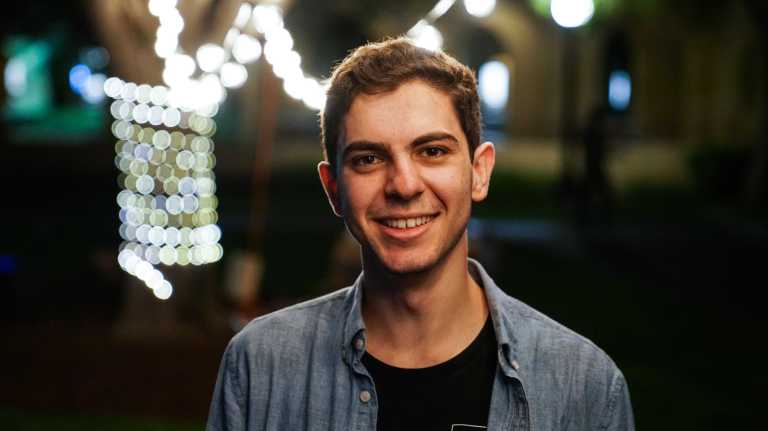This article is the second in a three-part series about Stanford’s Rhodes Scholars-elect for 2021: Nicolas Fishman, Abdallah AbuHashem and Ziyi Wang. If formally accepted by the Rhodes trustees, the trio will join a cohort of 99 other scholars-elect from around the globe on a full scholarship to the University of Oxford in England.
Abdallah AbuHashem ’19 M.S. ’21 was named one of Stanford’s three 2021 Rhodes Scholars-elect in October. He arrived at Stanford from Gaza, Palestine and has since excelled in developing both technical skills and fostering a dedication to helping others.
Peers describe him as an empathetic intellectual, and professors say that he has a unique ability to embody a breadth of abilities and a passionate pedagogy simultaneously through technology.
When he heard the news on Oct. 31, he was shocked: “Now what? How do I actually go from who I am … to that image that I have in my head of what a Rhodes Scholar is?” he recalled asking himself.
With a B.S. in computer science, AbuHashem is the published co-author of two academic papers and plans to pursue a career in academia in the long term. He is still trying to decide what he will study at Oxford and hopes to develop his interest in human-computer interaction (HCI) and education technology.
“Education seems likely,” he said, although he is also looking into the Oxford Internet Institute, where researchers investigate the intersections of computing and social science.
One of AbuHashem’s computer science professors, James Landay, happened to be at Tōno Coffee Project, a downtown Palo Alto coffee shop, the day he found out he had won. Landay said he asked AbuHashem, “Hey, shouldn’t you be practicing for your big interview this weekend?”
AbuHashem replied that it had happened already — “‘I didn’t think it went very well, but I won,’” Landay recalled AbuHashem saying. Landay described AbuHashem’s story as “very inspiring,” noting that he came from the Gaza Strip and calling it “totally one of the toughest places to grow up.”
“For him to go from there to get to Stanford is one thing, and then to do well at Stanford, which is a competitive place, is also amazing.”
AbuHashem’s friends described him as a brilliant scholar who goes to lengths to look out for others.
Crystal Zheng ’19 M.S. ’20, a good friend of AbuHashem’s who has taken several computer science classes with him, called his win “no surprise”: “I think he’s definitely very brilliant, and he’s always been super passionate in education, computer science, human-computer interaction and various fields,” she said.
Another close friend, Serena Jing ’22, described him as the type of person who “will drop everything to help anybody.”
Zheng said that during the application process, AbuHashem did not tell many people what he was doing, but it was evident that “he was very serious about it.”
Like many, AbuHashem came into Stanford knowing he wanted to study computer science. He had mostly learned through self-instruction and participating in some coding competitions. However, as he gained more technical knowledge and skills, he asked philosophical questions about the academic discipline: “I started to have this shift of how I see computer science,” AbuHashem said. “I started seeing it a lot more as this powerful toolbox that I have at my disposal … I started wondering, ‘Why or what am I going to do with this, and what is the purpose of this toolbox?’”
“What really drew me into HCI is the human-centered approach,” he added. “Most of your time is actually spent talking to people, trying to understand people, trying to develop ideas, trying to brainstorm, trying to prototype things, trying to test them.”
In his junior year, AbuHashem began taking education courses, namely EDUC 101: “Introduction to Teaching and Learning” with education senior lecturer Jennifer Wolf, whom he described as “one of the most amazing professors at Stanford.” He loved the class and decided to declare a minor in education with a concentration in educational technology, and his relationship with computer science continued to evolve.
“The last straw for me was summer of my junior year,” AbuHashem said. “I actually went ahead and I went to work at a big company as a software engineer.” During his time there, his experience confirmed his doubts about working at a big company.
“I didn’t find it having the impact that I wanted to have … I met a lot of really good friends who I’m still in touch with, but it wasn’t for me. I knew that I was looking for something different, which I felt like a Ph.D. would answer it better.”
Education and sociology professor Mitchell Stevens praised AbuHashem for finding a way to combine “very sophisticated computational skill with a deep and serious interest in educational improvement.” Stevens is a faculty co-lead of Stanford’s Pathways Lab and co-authored a paper with AbuHashem.
“Those are two attributes that are often found among Stanford students but not often in the same person,” Stevens added.
AbuHashem still does not know where the answer lies to his question about how to best use the computer science toolbox, but with a Ph.D. and a future in academia, he thinks there is a way to make a connection: “I think there is a path, and at least I think it’s a path that, for now, I’m willing to look into and try and see where it leads me,” he said.
This article has been corrected to reflect that Crystal Zheng is ’19, M.S. ’20 while Serena Jing is ’22. A previous version of this article stated Crystal Zheng was ’20 and Serena Jing was ’19, M.S. ’20. The Daily regrets this error.
Contact Matthew Turk at mjturk ‘at’ stanford.edu.
